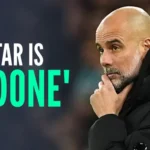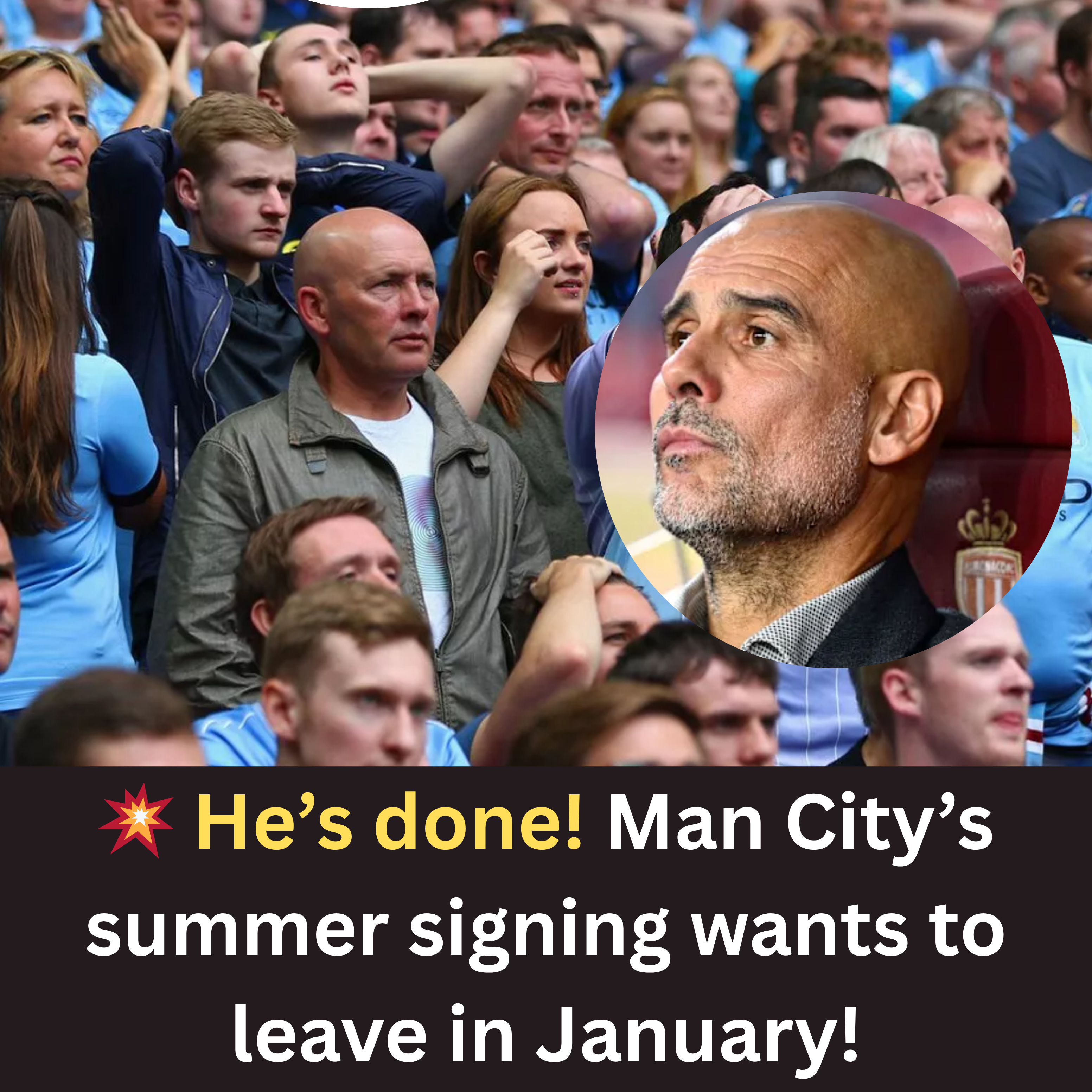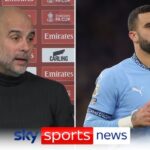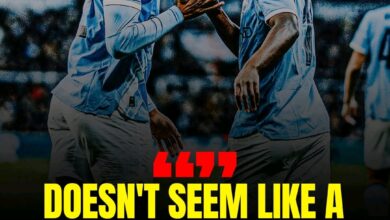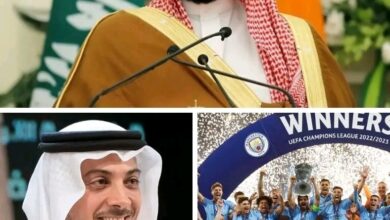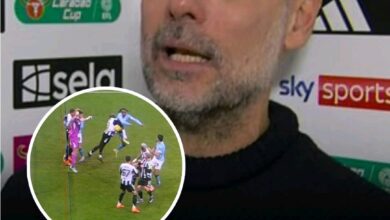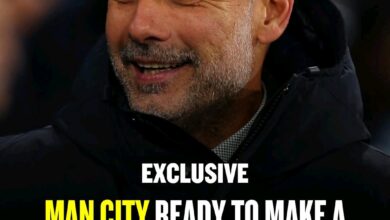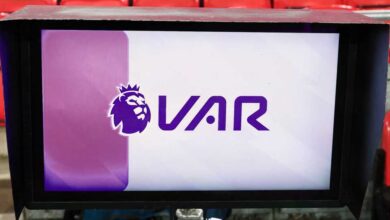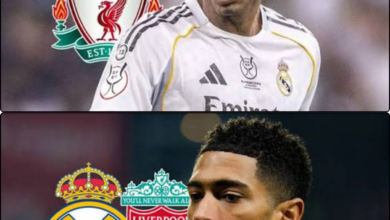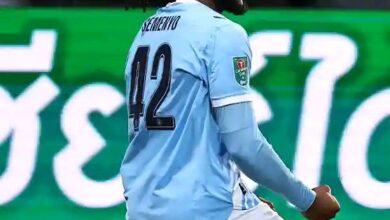If transfer rumour is true, £50m Man City player could now be the next Rio Ferdinand
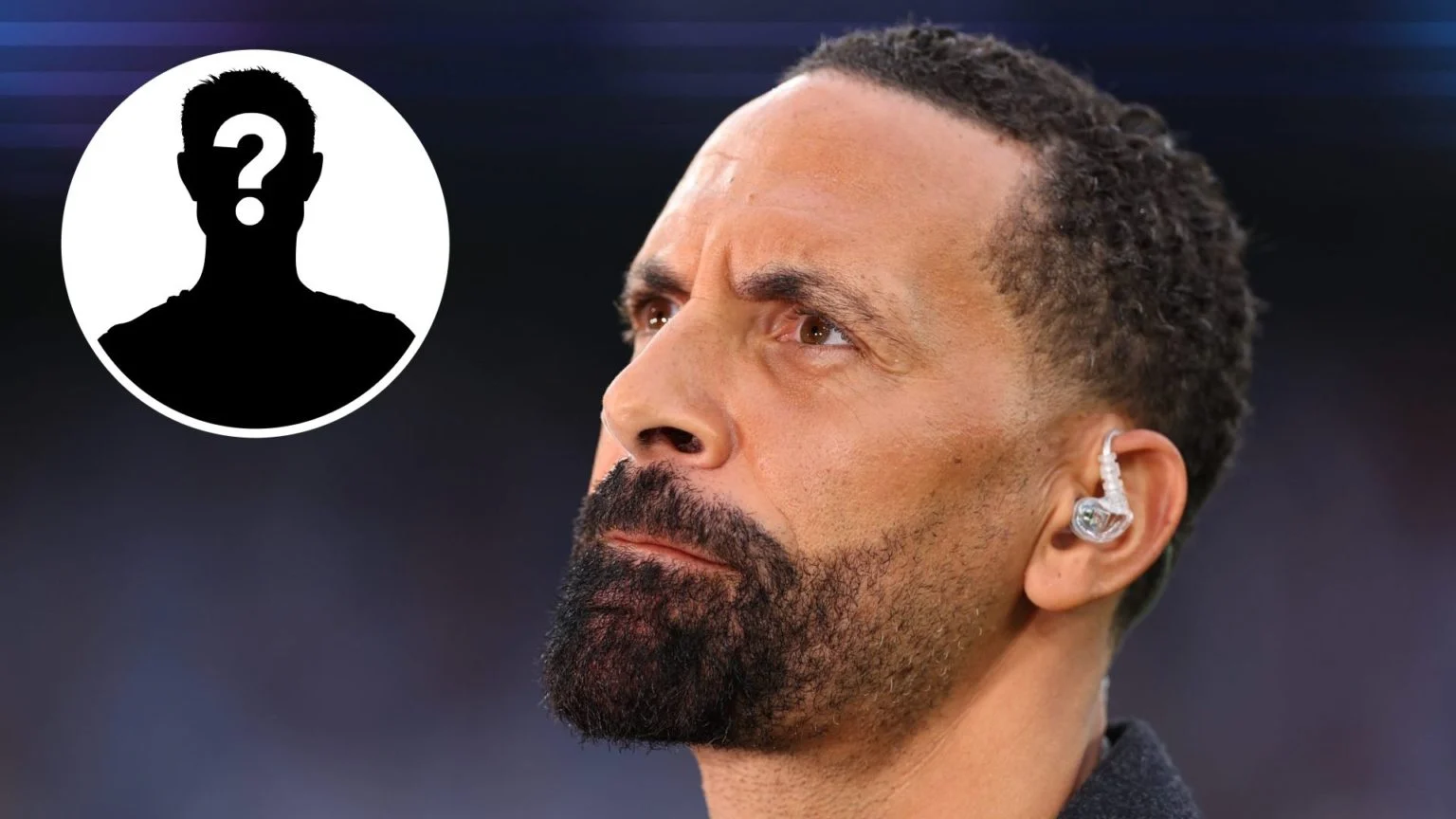
Rio Ferdinand’s move from Manchester United to Queens Park Rangers in 2014 serves as a stark reminder of the risks involved when leaving football’s elite tier. Ferdinand, like Walker, was a defender who had reached the pinnacle of his profession. His 12-year stint at Old Trafford had yielded six Premier League titles, one Champions League trophy, and numerous other honors. He was widely regarded as one of the finest center-backs of his generation, known for his reading of the game, composure on the ball, and leadership qualities.
The decision to join QPR, however, proved to be one of the most regrettable moves of Ferdinand’s illustrious career. Speaking on the Stick To Football podcast, Ferdinand was candid about his disappointment: “I wish I finished my career at Manchester United, rather than moving to QPR.” His revelation about a conversation with teammate Bobby Zamora particularly highlighted the gulf in standards between the clubs: “He started laughing for no reason. When he stopped, he asked me why I was at QPR as he could see my body was shutting down, I was getting injuries, I was having to plaster myself through games and manage myself through training sessions.”
Ferdinand’s motivation for the move was understandable on a personal level. He wanted to play closer to home in London, allowing his children to see him play during what he knew would be his final season. The desire to extend his career in familiar surroundings, combined with QPR’s financial offer, made the move seem logical at the time. However, the reality of playing for a relegation-threatened side, with inferior training facilities, tactical systems, and overall standards, quickly became apparent.
The parallels between Ferdinand’s situation in 2014 and Walker’s current predicament are striking. Both players were reaching the twilight of their careers at clubs that had set the standard for English football. Both were experiencing the natural decline that comes with age, making them less integral to their teams’ future plans. Most importantly, both faced the difficult decision of accepting a step down in competitive level for the promise of regular playing time and financial security.
The Everton Factor: A Club in Transition
Everton’s interest in Kyle Walker must be viewed within the context of the club’s current struggles and ambitions. The Toffees have endured several seasons of mediocrity, consistently battling relegation threats while attempting to rebuild their identity and competitive edge. The club’s recent history has been marked by poor transfer decisions, managerial instability, and financial constraints that have limited their ability to compete with the Premier League’s elite.
For Everton, signing a player of Walker’s caliber represents both an opportunity and a risk. On one hand, his experience, winning mentality, and proven Premier League credentials could provide valuable leadership for a young squad. His presence could help stabilize a defense that has been consistently vulnerable, while his attacking contributions from wide areas could add a new dimension to Everton’s play.
However, the risks are equally significant. Walker’s recent performances for Manchester City have shown clear signs of decline. His defensive positioning has become less reliable, his pace in recovery situations has diminished, and his decision-making under pressure has led to several high-profile errors. The demanding nature of playing for a relegation-threatened side, where every mistake is magnified and the pressure is relentless, could expose these weaknesses further.
The financial aspect of the deal also raises questions about Everton’s priorities. Investing heavily in a 35-year-old player, regardless of his pedigree, represents a short-term approach that may not align with the club’s need for sustainable development. The wages that Walker would command could limit the club’s ability to invest in younger players who might provide better long-term value.
The Physical Decline: Age Catches Up to Elite Athletes
The cruel reality of professional football is that physical decline is inevitable, regardless of how well-conditioned or naturally gifted a player might be. Kyle Walker’s situation exemplifies this universal truth. The defender who once routinely outpaced the Premier League’s fastest forwards now finds himself struggling to keep up with players a decade younger.
Walker’s pace has been his defining characteristic throughout his career. His ability to recover from advanced positions, track back to make crucial tackles, and overlap in attacking situations was largely dependent on his exceptional speed. As this attribute has diminished, other aspects of his game have been exposed. His positioning, while generally sound, was often compensated by his ability to recover quickly from minor errors. Without that safety net, mistakes that once went unnoticed have become glaring weaknesses.
The evidence of Walker’s decline is apparent in several high-profile incidents from the previous season. Gabriel Magalhães’ equalizing goal for Arsenal in their 2-2 draw with Manchester City showcased Walker’s reduced aerial ability and positioning. Similarly, Cody Gakpo’s strike in Liverpool’s 2-0 victory at Anfield highlighted the defender’s diminished pace and reaction time. These moments, while isolated incidents, represent a pattern of declining performance that suggests Walker’s best days are behind him.
The psychological aspect of this decline cannot be underestimated. For a player accustomed to being one of the fastest and most reliable defenders in the league, the gradual erosion of these abilities can be devastating. The confidence that comes from knowing you can recover from any situation begins to waver, leading to more cautious play and, paradoxically, more mistakes as overthinking replaces instinctive reactions.
The Tactical Evolution: Modern Demands on Fullbacks
The role of the modern fullback has evolved dramatically since Walker’s early career. Pep Guardiola’s tactical innovations have redefined what is expected from wide defenders, requiring them to be comfortable in possession, capable of playing in multiple positions, and able to contribute significantly to attacking play. Walker’s adaptation to these demands was initially successful, but the physical and mental requirements have become increasingly challenging as he has aged.
Modern fullbacks are expected to cover enormous distances during matches, shuttling between defensive and attacking positions while maintaining high levels of concentration and decision-making. They must be comfortable receiving the ball in tight spaces, capable of playing accurate passes under pressure, and able to defend against increasingly sophisticated attacking systems. These demands are particularly challenging for older players, whose physical and mental processing speeds naturally begin to decline.
Walker’s situation is further complicated by the tactical sophistication of Guardiola’s system. Manchester City’s approach requires constant movement, precise positioning, and split-second decision-making. The margin for error is minimal, and any decline in performance is quickly exposed. This environment, while challenging, has also provided Walker with tactical education and experience that could be valuable at a club like Everton, provided he can adapt his role to suit his current capabilities.
The Financial Implications: A £50 Million Gamble
The reported £50 million valuation for Kyle Walker reflects both his historical importance and the inflated nature of the modern transfer market. For Manchester City, this fee represents excellent business for a player who is clearly past his peak and approaching the end of his contract. The club’s willingness to sell Walker demonstrates their ruthless approach to squad management, prioritizing long-term success over sentiment.
For Everton, the financial commitment represents a significant gamble. The transfer fee, combined with Walker’s likely wage demands, represents a substantial investment in a player who may have limited resale value. This approach contrasts sharply with the modern trend toward investing in younger players who can develop and potentially generate future transfer profits.
The financial fair play implications of such a deal also warrant consideration. Everton’s recent struggles with financial regulations make any significant expenditure a calculated risk. Investing heavily in an aging player could limit the club’s ability to strengthen other areas of the squad or comply with spending restrictions.
The structure of the deal—whether permanent or a one-year loan—will be crucial in determining its success. A loan arrangement would provide Everton with Walker’s experience while limiting their financial exposure, but it would also represent a short-term fix rather than a strategic investment.
Learning from History: The Importance of Timing
Rio Ferdinand’s experience at QPR offers valuable lessons for both Walker and Everton. Ferdinand’s regret about leaving Manchester United highlights the importance of timing in career decisions. His desire to play closer to home and extend his career was understandable, but the reality of playing for a struggling side proved far more challenging than anticipated.
Ferdinand’s physical condition at QPR deteriorated rapidly, with the defender admitting to constant injury management and difficulty completing training sessions. The reduced quality of medical staff, training facilities, and overall support structure contributed to his struggles. These factors, combined with the increased pressure of fighting relegation, created a perfect storm that hastened his decline.
The psychological impact of the move was equally significant. Ferdinand went from being a key player at one of the world’s most successful clubs to struggling to maintain fitness at a relegation-threatened side. The contrast in standards, expectations, and support systems was stark and ultimately contributed to his decision to retire earlier than planned.
Walker must consider whether he is prepared for similar challenges. The step down from Manchester City to Everton, while not as dramatic as Ferdinand’s move to QPR, still represents a significant decrease in competitive level and support quality. The question is whether Walker’s current condition and mentality can handle this transition successfully.
The Alternative Paths: Other Options for Walker
Rather than accepting a move to Everton, Walker might consider alternative paths for the remainder of his career. The Major League Soccer (MLS) in the United States has become an increasingly attractive destination for aging European stars, offering competitive football without the intense physical demands of the Premier League. Players like Sebastian Giovinco, Andrea Pirlo, and more recently, Giorgio Chiellini, have found success and fulfillment in MLS while extending their careers in a less demanding environment.
Similarly, other European leagues might offer Walker the opportunity to continue playing at a high level without the specific challenges of Premier League football. Serie A, in particular, has a reputation for accommodating older players, with its tactical sophistication potentially suiting Walker’s current skill set better than the high-intensity Premier League.
The possibility of transitioning into coaching or punditry also presents attractive options for a player of Walker’s experience and knowledge. His tactical education under Guardiola, combined with his extensive Premier League experience, would make him an attractive candidate for coaching positions or media roles.
The Psychological Challenge: Adapting to Reduced Expectations
Perhaps the most significant challenge facing Walker in any potential move away from Manchester City is the psychological adjustment to reduced expectations and standards. Players who have experienced the highest levels of success often struggle to adapt to environments where winning is not the default expectation.
At Manchester City, Walker has been accustomed to competing for every available trophy, playing in front of sell-out crowds, and working with world-class teammates and coaching staff. The transition to a club like Everton, where the primary objective is Premier League survival rather than trophy collection, represents a fundamental shift in mindset and motivation.
This psychological challenge extends beyond individual performance to encompass the player’s role within the team structure. At Manchester City, Walker was part of a well-oiled machine where every player understood their role and responsibilities. At Everton, he would likely be expected to provide leadership and guidance to younger players while adapting to a less sophisticated tactical system.
The media scrutiny and fan expectations also differ significantly between the clubs. While Manchester City players are expected to perform at the highest level consistently, there is an understanding of the club’s resources and ambitions. At Everton, a high-profile signing like Walker would face intense scrutiny and pressure to justify the investment, particularly if early performances fail to meet expectations.
Conclusion: A Career-Defining Decision
Kyle Walker’s potential move to Everton represents far more than a simple transfer between Premier League clubs. It embodies the universal challenge faced by aging athletes: knowing when to step away from the pinnacle of success and how to navigate the inevitable decline that comes with time.
The parallels to Rio Ferdinand’s experience at QPR serve as both a warning and a guide. Ferdinand’s regret about leaving Manchester United highlights the emotional and professional costs of poorly timed career decisions. His struggles with fitness, form, and fulfillment at QPR demonstrate the risks involved when elite athletes step down from the highest level of competition.
Walker must carefully weigh the potential benefits of regular playing time and financial security against the risks of damaging his legacy and accelerating his decline. The decision will ultimately define how his remarkable career is remembered—as a player who gracefully transitioned from elite success to a valuable contributor at a developing club, or as another cautionary tale of a star who stayed too long at football’s top table.
For Everton, the potential signing represents both an opportunity to add experience and quality to their squad and a risk of investing heavily in a player whose best days may be behind him. The club’s recent history suggests a need for careful consideration of both the immediate impact and long-term implications of such a significant investment.
Ultimately, Walker’s decision will serve as another chapter in football’s ongoing narrative about the challenges of career transitions and the importance of timing in professional sports. Whether it becomes a success story or joins Ferdinand’s move to QPR as a cautionary tale will depend on Walker’s ability to adapt his expectations, maintain his physical condition, and contribute meaningfully to his new team’s objectives.
The football world will watch with interest as this story unfolds, knowing that the outcome will provide valuable insights into the complex decisions facing aging athletes in an increasingly demanding sport. Walker’s choice will not only shape the remainder of his career but also influence how future players in similar situations approach their own career transitions.

